This Lemon Ginger Kombucha recipe has a classic citrusy flavor, perfect for your homemade kombucha!
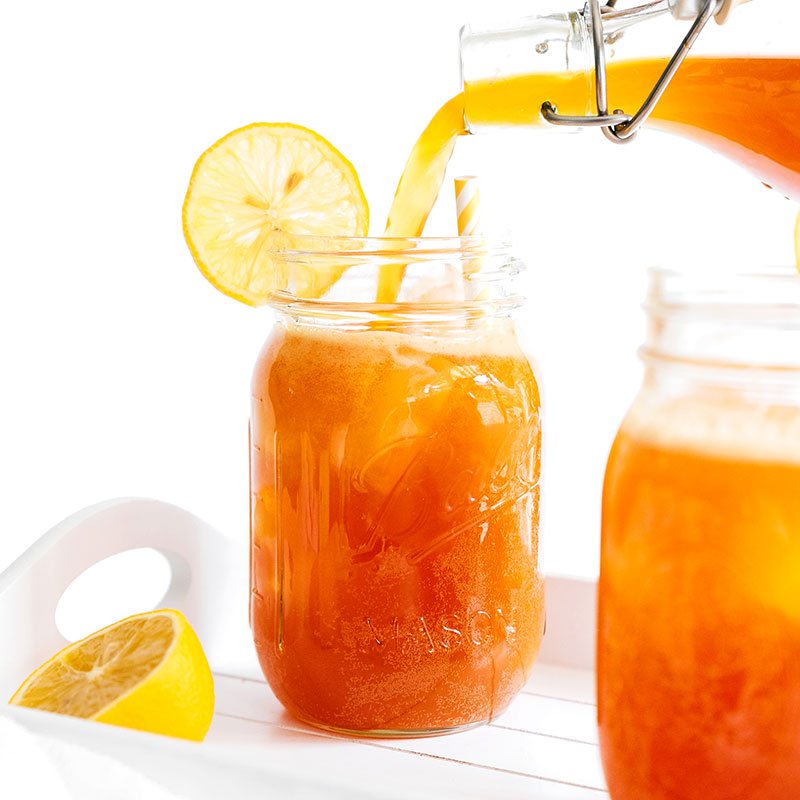
There’s a magical tonic the tulip-man blends up anytime one of us so much as sneezes. It involves blending lemon and ginger and good quality honey, which he then uses as a syrup for adding instant, healthy flavor to water.
So naturally, I had to make a kombucha version of it. Because lemon + ginger + kombucha is a match made in heaven. The result is a slightly tart, slightly sweet, seriously refreshing kombucha! It can even be made low carb if that’s your thing by simply omitting the honey. Let’s brew.
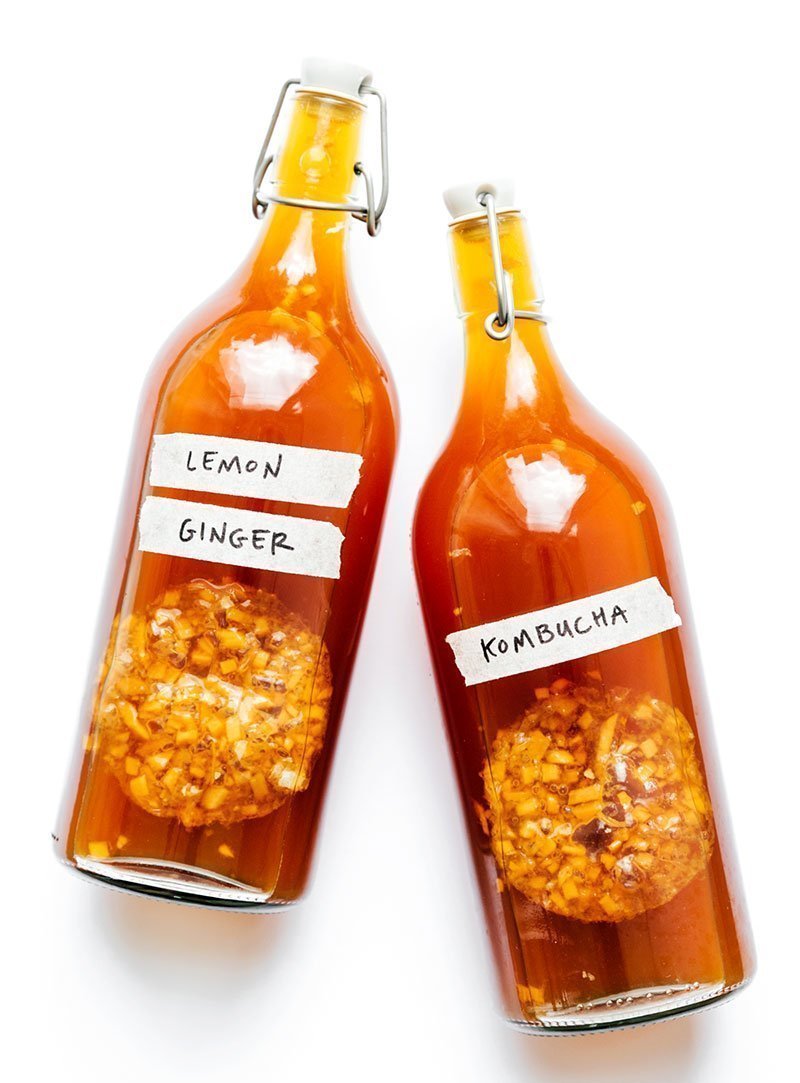
There are two main fermentation phases when making homemade kombucha:
- First Fermentation: This is when you transform sweet tea into tart and delicious kombucha (see our comprehensive guide to homemade kombucha here)
- Second Fermentation: This is when you carbonate the kombucha by adding flavor and sugars and bottling it (this is what we’re doing today with this kombucha!)
In order to make this citrusy kombucha, you will need to have finished the first fermentation already and have some kombucha that’s ready to be carbonated!
“This is, hands-down, the favorite flavor of my friend and daughter (and of course me). But the ginger never dissolves it turns into a cork-y texture and flavor and I have no idea how to filter it out and still drink it out of the bottle from the second fermentation. Should I filter it and pour it into a clean bottle after the second fermentation? Suck it up and drink it from a glass? Are there fermentation special bottles with fancy filters on them? Help!”
INGREDIENTS FOR LEMON GINGER KOMBUCHA
- Kombucha: You’ve brewed your kombucha in the first fermentation with the help of your SCOBY and it’s the perfect balance of sweet and tart (step-by-step first fermentation instructions here).
- Lemon: Fresh lemon juice is packed with flavor and antioxidants, and gives this kombucha a delightfully tart taste.
- Ginger: We’ll chop it finely (or grate it) to infuse the kombucha with ginger flavor.
- Honey: A dash of honey will provide the sugars needed to carbonate the kombucha. For a vegan option, substitute the honey for white sugar.
For a fun twist, you can also try adding pepper to your kombucha (like the tulip-man did with this Spicy Ginger Kombucha). Or add some cloves and orange juice to make a delicious Ginger Ale Kombucha. Or replace the lemon with grapefruit like in this Ginger Grapefruit Kombucha.
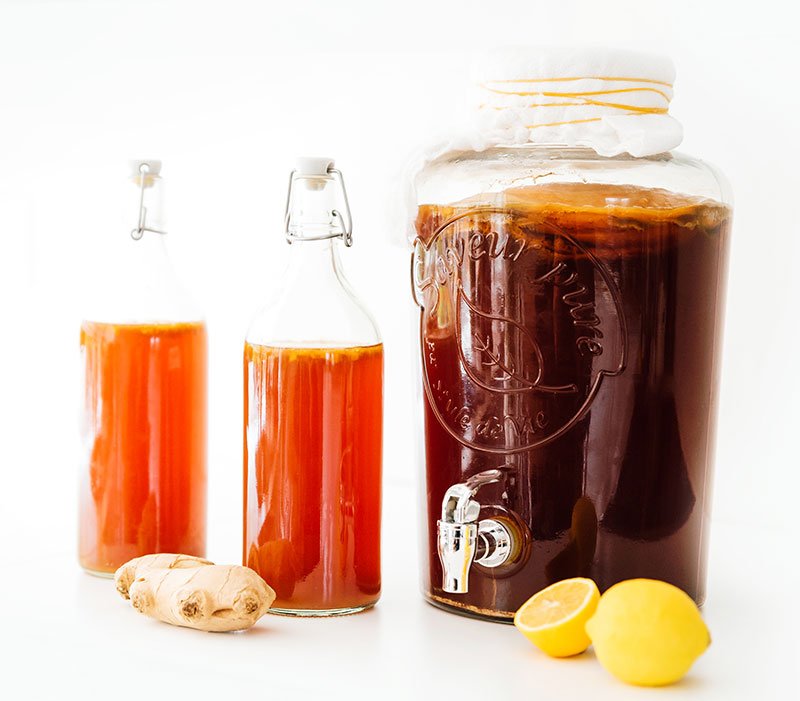
HOW TO MAKE LEMON GINGER KOMBUCHA
Making your own Lemon Ginger Kombucha is super easy. The process goes something like this:
- Prep: Juice the lemons and finely chop or grate the ginger.
- Bottle: Add kombucha, lemon juice, ginger, and honey to fermentation bottles.
- Ferment: For 3 to 10 days, until it reaches the carbonation level you like.
- Enjoy: Chill in the fridge before serving.
P.S. this lemon kombucha is so tasty when used to make a kombucha shandy!
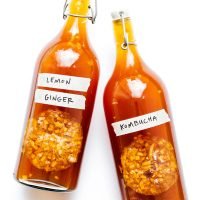
Home Brewed Lemon Ginger Kombucha
Ingredients
- ½ gallon kombucha from a first fermentation this is not store bought kombucha, 1.9 L
- 2 lemons ¼ cup lemon juice
- 1 thumb fresh ginger 1 Tbsp chopped or grated
- 2 tsp honey sub white sugar for vegan option
Instructions
- Prep: Juice the lemons (you need ¼ cup of juice). Finely chop or grate the ginger (you need 1 Tbsp).
- Bottle: Transfer kombucha into fermentation bottles*, leaving about 2 inches empty at the top. Equally distribute lemon juice, ginger, and honey into bottles. Seal tightly.
- Ferment: Place in a dark, room temperature area for 3 to 10 days, until it reaches the carbonation level you like. This process will go faster in warmer climates, and slower in cooler climates.
- Enjoy: Chill in the fridge before serving. Can be stored in the fridge, tightly sealed, for several weeks.
Video
Notes
Recommended Products
As an Amazon Associate and member of other affiliate programs, I earn from qualifying purchases.
Nutrition
I first published this Lemon Ginger Kombucha on my vegetarian food blog, Live Eat Learn.
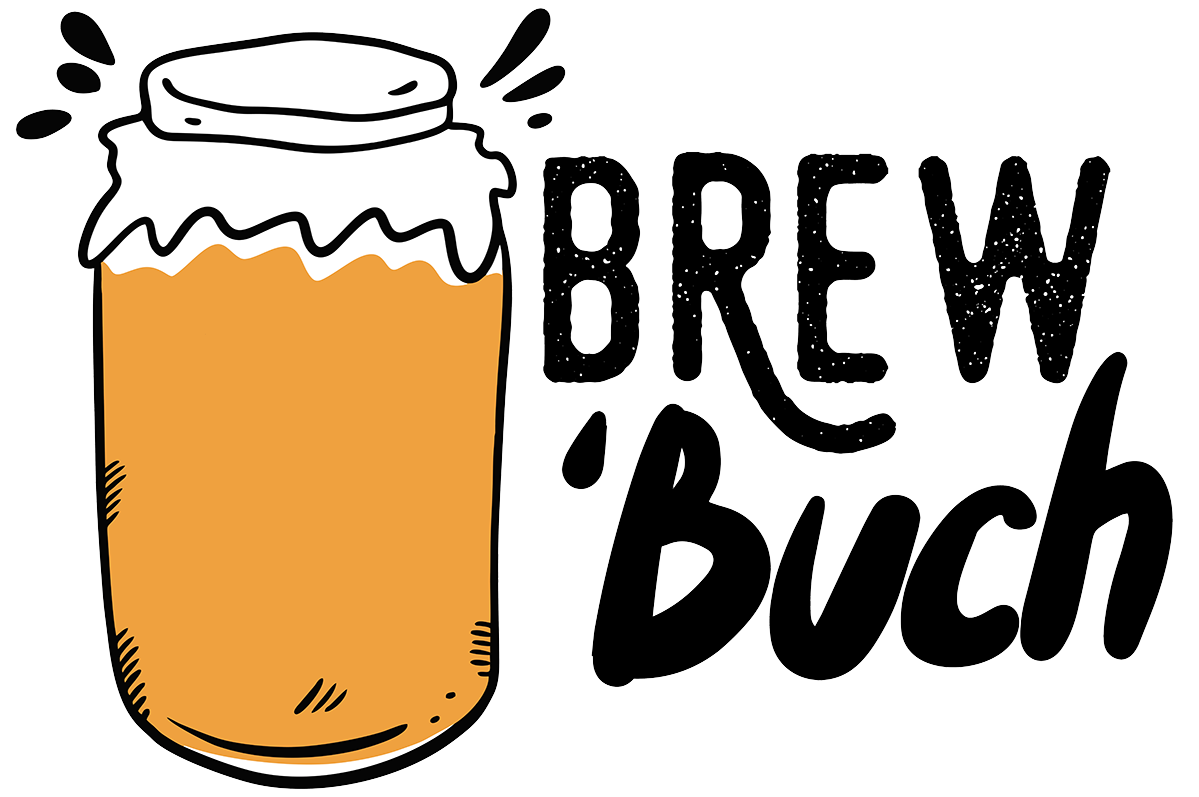
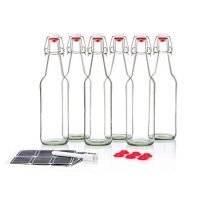
Great stuff! Fresh is always best, but in a pinch could lemon powder be used instead?
I haven’t tried it but I think it would work!
Can I use ground ginger spice vs actual ginger root?
Yes! 😀
Thanks for the amazing recipes! In your post about the best sugars to use in kombucha brewing, you state the dangers of using honey, “This natural sugar can contain botulism bacteria (especially raw honey), which could create a dangerous brew.”.
So I was wondering why you now use honey as though it is fine for second fermentation when you use to state that it was dangerous to do so? Is there some aspect I am missing here, are you using non-raw honey?
Honey shouldn’t be used in the first fermentation, because there aren’t enough of the good kombucha bacteria to keep the balance of good bacteria. In the second fermentation, however, there should be enough good bacteria to keep the potential for botulism (or other bad bacteria) from growing out of hand.
This is, hands-down, the favorite flavor of my friend and daughter (and of course me). But the ginger never dissolves it turns into a cork-y texture and flavor and I have no idea how to filter it out and still drink it out of the bottle from the second fermentation. Should I filter it and pour it into a clean bottle after the second fermentation? Suck it up and drink it from a glass? Are there fermentation special bottles with fancy filters on them? Help!
So happy to hear it, Kellie! The ginger won’t dissolve – it’s too fibrous. I use a small wire sieve (like one meant for tea) and simply pour the kombucha from the bottle through the sieve and directly into the drinking glass (if that makes sense?) (like this). Though a fancy fermentation bottles sounds like a great idea! 😀